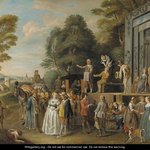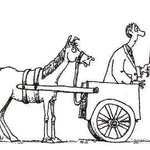What does science show about incentives for HIV testing?
Dec. 13, 2011, 11:17 a.m.
|
The Western Cape government has implemented a lottery to encourage people to get tested for HIV. People who get tested can enter the lottery and win large cash prizes. In the fiery world of Cape Town politics, there has been much vitriol from both supporters and detractors of the lottery. But what does science show about incentives for HIV testing? |
The False Hope Industry
Dec. 9, 2011, 9:39 a.m.
|
On a cold, rainy day in 2008 I went to a presentation by Professor John Flannery of UC Berkeley at the University of Cape Town Medical School. The topic for the day was progress in retinal degenerative diseases. The turn-out wasn’t bad - a few journalists, a few NGO people, a few patients and some doctors and researchers. Afterward, I waited outside for my editor who was picking me up on her way home (I was working for Health24 at the time). No doubt she’d ask how it went. Try as I may, I ... |
Electromagnetic Quackery
Dec. 1, 2011, 9:25 a.m.
|
Today, on World AIDS Day the Treatment Action Campaign (TAC) will picket at the Durban offices of HIVEX Limited and demand that they stop offering HIVEX as a treatment for HIV. This follows a remarkable letter that HIVEX sent to TAC and an investigation by the television programme Special Assignment. |
How a quack HIV cure is endangering a lizard species
Nov. 23, 2011, 3:51 p.m.
|
Catherine Tomlinson explains how AIDS quackery is reducing the numbers of a Malaysian lizard. |
Premier Helen Zille's views on HIV are misinformed and unscientific
Nov. 15, 2011, 3 p.m.
|
We take issue with Premier Helen Zille's views on HIV transmission, criminalisation and who deserves treatment. This is an expanded version of an article that was published in The Cape Argus on 15 November 2011. |
How medicines are tested
Nov. 9, 2011, 1:31 p.m.
|
Adverts often claim that their product is scientifically tested. What does this actually mean? This article explains the testing process a medicine usually has to go through before reputable regulatory authorities approve it as a treatment for a disease. |
Why is UCT hosting a royal quack?
Nov. 3, 2011, 4:53 p.m.
|
On Saturday 5 November His Royal Highness the Prince of Wales will be addressing the University of Cape Town community at Jameson Hall on environmental issues relating to the upcoming COP17 meeting in Durban. |
Christ Embassy takes ASASA and TAC to court
Nov. 2, 2011, 10:56 a.m.
|
Christ Embassy is taking the Advertising Standards Authority (ASASA) and the Treatment Action Campaign (TAC) to court. The church is trying to get part of an ASASA ruling against it overturned. |
Cart before the horse advertising
Oct. 27, 2011, 11:06 a.m.
|
Several vitamin trials have been published over the last few years that debunk the claims of many vitamin selling companies. These trials show why it is important to test claims about products before advertising them. |
How should the chaos be regulated?
Oct. 25, 2011, 7:17 a.m.
|
The government recently published guidelines and regulations for the registration of complementary medicines. Public submissions were requested. Marcus Low has previously written about this for Quackdown. The Association for Responsible Health Information and Advertising (ARHIA) and the Treatment Action Campaign (TAC) have both made submissions. |










